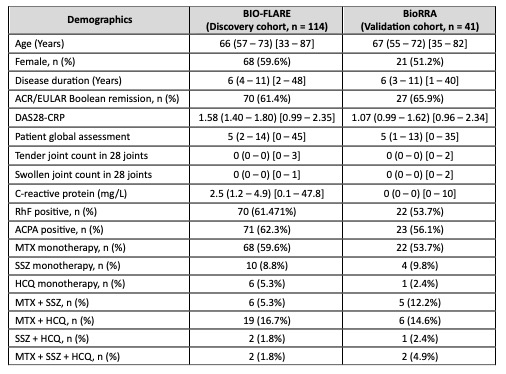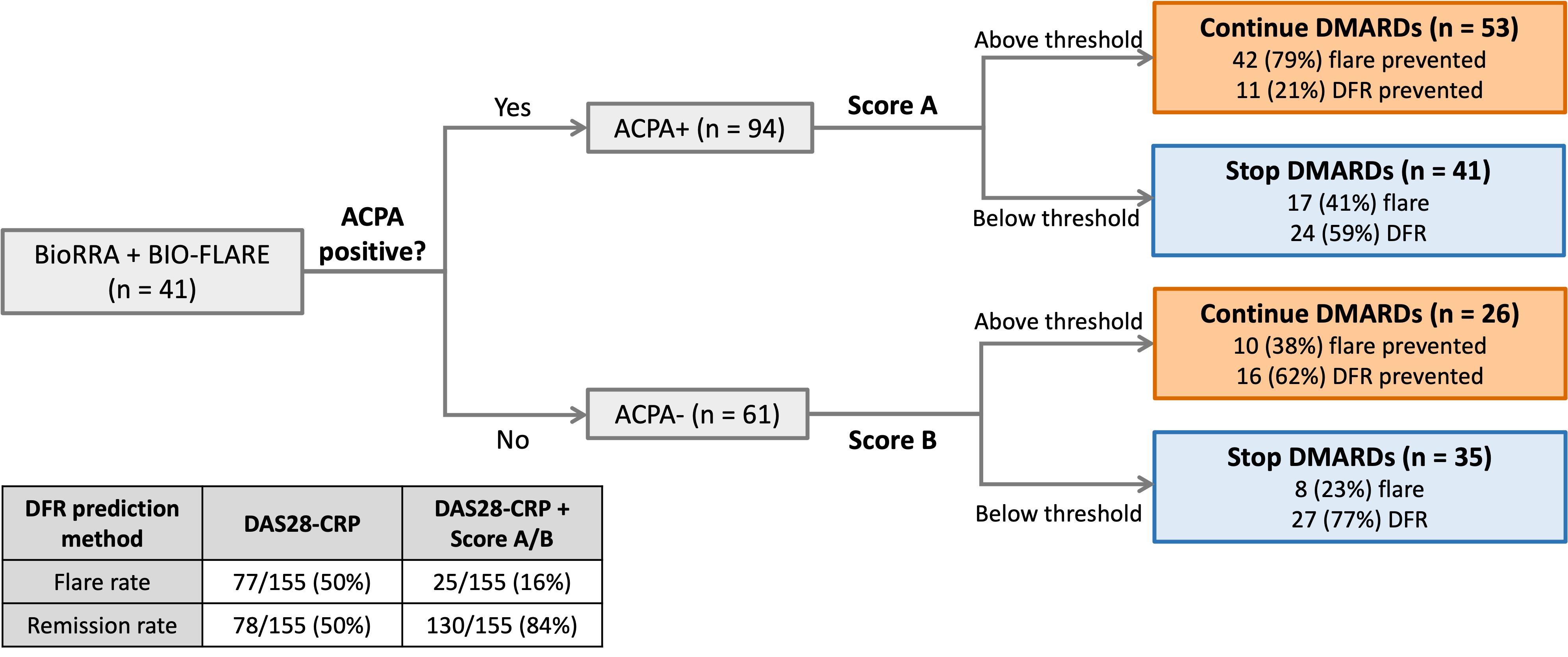Session Information
Session Type: Poster Session B
Session Time: 10:30AM-12:30PM
Background/Purpose: Recent studies show that half of patients with RA remission can stop conventional synthetic disease-modifying anti-rheumatic drug (csDMARD) therapy to achieve drug-free remission (DFR), although reliable methods to predict this remain elusive. We aimed to identify and validate circulating cytokine biomarkers that, when measured prior to csDMARD cessation, can predict future flare versus DFR.
Methods: Luminex immunoassays were used to quantify 19 circulating cytokines in serum and plasma samples from the BIOlogical Factors that Limit sustAined Remission in rhEumatoid arthritis (BIO-FLARE) study (discovery cohort: n = 114 patients) and the Biomarkers of Remission in Rheumatoid Arthritis (BioRRA) study (validation cohort: n = 41 patients) respectively. All patients in both studies fulfilled the 1987 ACR or 2010 ACR/EULAR classification criteria for RA diagnosis. Both studies followed the same intervention strategy: RA patients in remission, defined as a Disease Activity Score in 28 joints with C-reactive protein (DAS28-CRP) < 2.4, stopped single or combination csDMARDs (methotrexate, sulfasalazine and hydroxychloroquine) and were monitored for 6 months. Flare was defined as DAS28-CRP ≥ 3.2 or DAS28-CRP ≥ 2.4 on 2 occasions within 14 days (BIO-FLARE); or DAS28-CRP ≥ 2.4 (BioRRA). Lasso regression was used to form composite cytokine scores that differentiated DFR and future flare, with prognostic performance assessed by area under the receiving operating characteristic curves (AUC).
Results: Two composite scores were developed to predict future flare and DFR in patients with or without anti-citrullinated peptide antibodies (ACPA). The composite score for seropositive RA included MMP-1, S100A8, and IL-6Ra, while TNF-a and IL-6Ra formed the predictive score for seronegative RA. In the discovery cohort, these two scores predicted future flare and DFR in ACPA+ and ACPA- patients with an AUC of 0.71 (95% confidence interval 0.59 – 0.83) and 0.76 (0.59 – 0.94) respectively. In the independent validation cohort, the same scores had an AUC of 0.72 (0.51 – 0.94) and 0.54 (0.24 – 0.83) respectively. If a strategy of drug cessation only in patients with below-threshold composite biomarker scores had been applied to both cohorts, 76/155 (49%) patients would have been eligible for stopping DMARDs with a lower overall flare rate (flare rate with biomarker 25/155 (16%) vs. 77/155 (50%) without biomarker; positive predictive value 65.8% [55.4 – 76.3], negative predictive value 67.1% [56.5 – 77.7]).
Conclusion: We present two validated composite cytokine scores that predict flare and DFR in patients with RA. Our next steps are to further validate our findings in an interventional clinical trial of drug cessation stratified by these biomarkers.
To cite this abstract in AMA style:
Sim J, Ramamoorthi N, Rayner F, Degnan A, Wilson I, Diboll J, Guttman A, Melville A, Rathore N, Siebert S, McInnes I, Goodyear C, Hilkens C, Filer A, Raza K, Buckley C, Pratt A, Wason J, Anderson A, Townsend M, Baker K, Isaacs J. Two Composite Cytokine Scores Predict Flare and Drug-free Remission in Patients with Rheumatoid Arthritis [abstract]. Arthritis Rheumatol. 2024; 76 (suppl 9). https://acrabstracts.org/abstract/two-composite-cytokine-scores-predict-flare-and-drug-free-remission-in-patients-with-rheumatoid-arthritis/. Accessed .« Back to ACR Convergence 2024
ACR Meeting Abstracts - https://acrabstracts.org/abstract/two-composite-cytokine-scores-predict-flare-and-drug-free-remission-in-patients-with-rheumatoid-arthritis/


